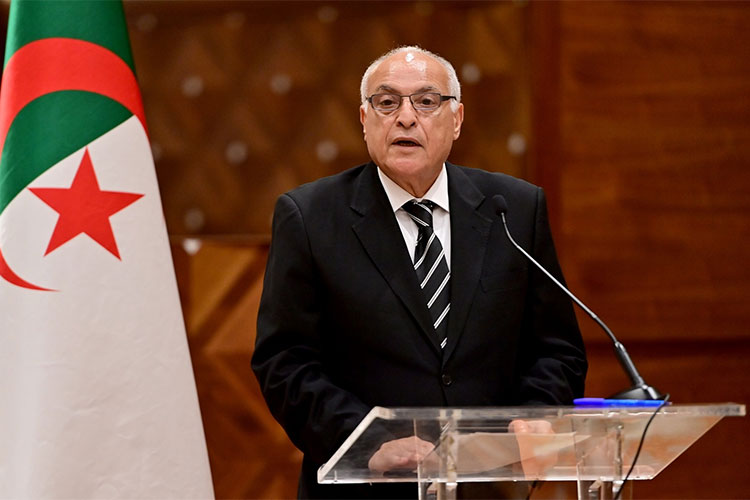Niger Crisis: Attaf Responds to France From Washington

The Minister of Foreign Affairs and the National Community Abroad, Ahmed Attaf, was keen to explain the Algerian position on the military coup that overthrew the President of Niger, Mohamed Bazoum, based on two interviews with two well-known American newspapers, the Washington Post and Al-Monitor, on the sidelines of the visit that led him to USA, last week, which was the endeavour that followed a “faltering exit” by the French Minister of the Armed Forces, Sébastien Lecornu, who tried hard to justify the inevitability of military intervention in Algeria’s southern neighbour.
In his interview with the two newspapers, the Algerian head of diplomacy stressed that any military intervention in Niger would fail, and explained that searching for solutions to this crisis outside diplomatic means is “a complicated option, and its success is very far away”, which is the position that Algeria had previously expressed on the lips of more than one official since it stood on a rally of positions by the Economic Community of African States “ECOWAS”, driven by a French incitement that raises many questions.
According to the Algerian foreign minister, “There are not that many countries that support the military dimension as a first choice,” Attaf said. “All of us agree on the fact that we should give time to a political and diplomatic solution” because a military solution will lead to “huge consequences” and a wider conflict will erupt in Niger, including the potential for regional militant groups to take advantage of the instability, a loss of oil revenue for state-owned company Sonatrach and waves of migration on Algeria’s doorstep”, meaning that it would damage Algeria’s interests in the region through destroying Sonatrach’s investments in Nigerian oil, as well as the growing phenomenon of illegal immigration from the Sahel region.
The position expressed by the Minister of Foreign Affairs is considered the third warning of its kind from a high official in the Algerian state, and it comes after that issued by the President, Abdelmadjid Tebboune, in his last interview with the national press, in which he expressed his categorical rejection of any foreign interference in Niger, Likewise, the Algerian Army Chief of Staff, General Said Chengriha, who spoke about its repercussions, the foremost of which is the perpetuation of instability in the Sahel region.
Attaf presented his vision of the solution that Algeria deems appropriate for the crisis in its southern neighbour and said that it is based on three main principles, which are respect for the constitutional and democratic order. That President Mohamed Bazoum should return to power, and finally: priority should be given to resolving the conflict diplomatically, completely ruling out the military solution that ECOWAS applauded and behind it, France, which is the most affected by what is happening in the Sahel region.
The statements of the Algerian officials come in contrast to those issued by the French Minister of the Armed Forces, Sébastien Lecornu, two days ago in an interview with the newspaper “Var Matan”, which tried to give the impression that the military intervention in Niger is an inevitable decision because the issue is related to “Collective Security”.
The French official claims that the wave of coups that swept the region and affected both Mali and Burkina Faso weakened the battle against terrorism in the Sahel region and revived the “hotbed of terrorism” on the shores of the Mediterranean Sea, despite the great distance between the Sahel region and the shores of the Mediterranean.
Further, the French Minister of the Armed Forces ignored his country’s responsibility for breeding terrorism in the region, due to the failure of its military intervention in both Mali and Burkina Faso since 2013 under several names, which began with “Serval”, and when the operation failed, its name was changed to “Barkhane”, no matter how different its nomenclature is, the common denominator among them is failure. Rather, the current Malian authorities have evidence of France’s involvement in training and protecting terrorist groups from the strikes of the Malian army, and the statement was issued by the head of the transitional government in this country, Choguel Maiga, to the Russian “Ria Novosti” website.
Paris feels a state of isolation even in its western surroundings in how to deal with the crisis in Niger, as everyone is against military intervention in this country, including its major partners in the European Union, Germany and Italy, and the United States of America from outside the union, which prompted Lecornu to criticize his Western allies, saying: “The war in Ukraine makes some Western observers short-sighted. We no longer talk about the fight against terrorism in our public discussion.”
Officials in France are trying, by all means, to stand in the way of the military coups sweeping the region, to prevent the continued collapse of regimes loyal to them in their former African colonies. Therefore, they encourage military intervention in Niger, based on the geopolitical domino theory invented by American diplomacy in the fifties of the past century to justify military interventions in the world, to limit the collapse of the regimes loyal to it in front of the communists loyal to the former Soviet Union.




